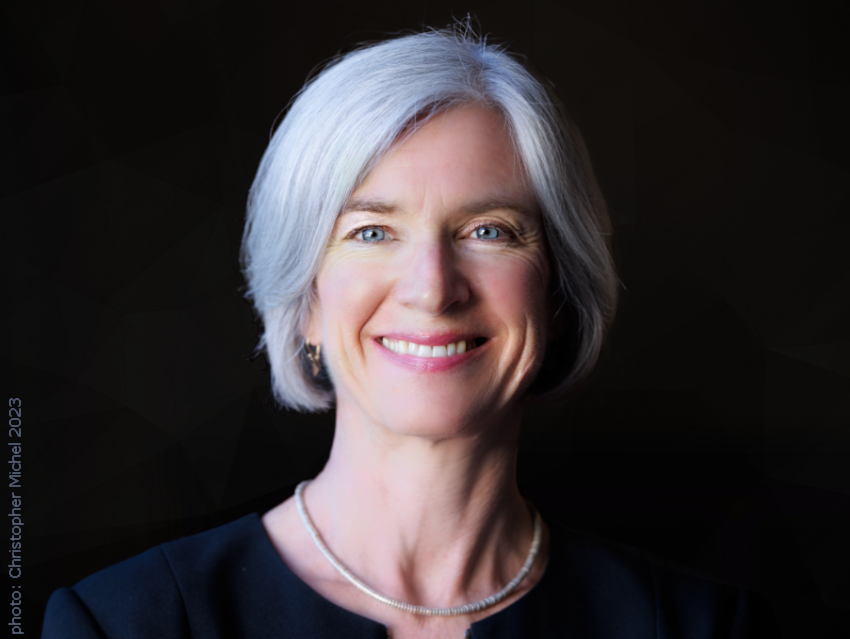Jennifer A. Doudna, University of California, Berkeley, USA, and 2020 Nobel Laureate in Chemistry, celebrates her 60th birthday on February 19, 2024.
Jennifer Anne Doudna pioneered CRISPR gene editing and made other fundamental contributions to biochemistry and genetics and is one of the first women to share a Nobel Prize in Chemistry. The 2020 Nobel Prize in Chemistry was jointly awarded to Emmanuelle Charpentier, Max Planck Unit for the Science of Pathogens, Berlin, Germany, and her “for the development of a method for genome editing”. Since Charpentier and Doudna discovered CRISPR/Cas9 in 2012, its use has exploded. This tool has contributed to many important discoveries in basic science and medicine.
Jennifer A. Doudna, born in Washington, D.C., USA, in 1964, studied biochemistry at Pomona College, Claremont, CA, USA, and received her Ph.D. from Harvard Medical School, Boston, USA, in 1989. From 1989 to 1991, she held research fellowships in molecular biology at Massachusetts General Hospital and in genetics at Harvard Medical School. From 1991 to 1994, she was the Lucille P. Markey Postdoctoral Scholar in Biomedical Science at the University of Colorado Boulder, USA. In 2000, she was appointed the Henry Ford II Professor of Molecular Biophysics and Biochemistry at Yale University, New Haven, Connecticut, USA. From 2000 to 2001, she was the Robert Burns Woodward Visiting Professor of Chemistry at Harvard University, USA. Since 2000, she has been a professor at the University of California, Berkeley, USA, and an Investigator, Howard Hughes Medical Institute.
In addition to the Nobel Prize and many other honors, she received the Wolf Prize in Medicine in 2020 with Emmanuelle Charpentier, the Kavli Prize in Nanoscience in 2018, the Japan Prize in 2017, the Breakthrough Prize in Life Sciences in 2015, and the Alan T. Waterman Award in 2000.
In 2017, Doudna co-founded the bioengineering technology startup Mammoth Biosciences, San Francisco, CA, USA, which focuses on improving access to biosensing tests that address “challenges in healthcare, agriculture, environmental monitoring, biodefense, and more.”
Selected Publications
- Jennifer R. Hamilton, Evelyn Chen, Barbara S. Perez, Cindy R. Sandoval Espinoza, Min Hyung Kang, Marena Trinidad, Wayne Ngo, Jennifer A. Doudna, In vivo human T cell engineering with enveloped delivery vehicles, Nat. Biotechnol. 2024. https://doi.org/10.1038/s41587-023-02085-z
- Joy Y. Wang, Owen T. Tuck, Petr Skopintsev, Katarzyna M. Soczek, Gary Li, Basem Al-Shayeb, Julia Zhou, Jennifer A. Doudna, Genome expansion by a CRISPR trimmer-integrase, Nature 2023, 618, 855–861. https://doi.org/10.1038/s41586-023-06178-2
- Jennifer A. Doudna, The promise and challenge of therapeutic genome editing, Nature 2020, 578, 229–236. https://doi.org/10.1038/s41586-020-1978-5
- Parinaz Fozouni, Sungmin Son, María Díaz de León Derby, Gavin J. Knott, Carley N. Gray, Michael V. D’Ambrosio, Chunyu Zhao, Neil A. Switz, G. Renuka Kumar, Stephanie I. Stephens, Daniela Boehm, Chia-Lin Tsou, Jeffrey Shu, Abdul Bhuiya, Maxim Armstrong, Andrew R. Harris, Pei-Yi Chen, Jeannette M. Osterloh, Anke Meyer-Franke, Bastian Joehnk, Keith Walcott, Anita Sil, Charles Langelier, Katherine S. Pollard, Emily D. Crawford, Andreas S. Puschnik, Maira Phelps, Amy Kistler, Joseph L. DeRisi, Jennifer A. Doudna, Daniel A. Fletcher, Melanie Ott, Amplification-free detection of SARS-CoV-2 with CRISPR-Cas13a and mobile phone microscopy, Cell 2020. https://doi.org/10.1016/j.cell.2020.12.001
- S. C. Knight, R. Tjian, J. A. Doudna, Genomes in Focus: Development and Applications of CRISPR-Cas9 Imaging Technologies, Angew. Chem. Int. Ed. 2018, 57, 4329–4337. https://doi.org/10.1002/anie.201709201
- M. Jinek, F. Jiang, D. W. Taylor, S. H. Sternberg, E. Kaya, E. Ma, C. Anders, M. Hauer, K. Zhou, S. Lin, M. Kaplan, A. T. Iavarone, E. Charpentier, E. Nogales, J. A. Doudna, Structures of Cas9 Endonucleases Reveal RNA-Mediated Conformational Activation, Science 2014, 343, 1247997. https://doi.org/10.1126/science.1247997
- J. A. Doudna, E. Charpentier, The new frontier of genome engineering with CRISPR-Cas9, Science 2014, 346, 1258096. https://doi.org/10.1126/science.1258096
- L. A. Gilbert, M. H. Larson, L. Morsut, Z. Liu, G. A. Brar, S. E. Torres, N. Stern-Ginossar, O. Brandman, E. H. Whitehead, J. A. Doudna, W. A. Lim, J. S. Weissman, L. S. Qi, CRISPR-Mediated Modular RNA-Guided Regulation of Transcription in Eukaryotes, Cell 2013, 154, 442–451. https://doi.org/10.1016/j.cell.2013.06.044
- L. S. Qi, M. H. Larson, L. A. Gilbert, J. A. Doudna, J. S. Weissman, A. P. Arkin, W. A. Lim, Repurposing CRISPR as an RNA-Guided Platform for Sequence-Specific Control of Gene Expression, Cell 2013, 152, 1173–1183. https://doi.org/10.1016/j.cell.2013.02.022
- M. Jinek, A. East, A. Cheng, S. Lin, E. Ma, J. Doudna, RNA-programmed genome editing in human cells, eLife 2013. https://doi.org/10.7554/eLife.00471
- M. Jinek, K. Chylinski, I. Fonfara, M. Hauer, J. A. Doudna, E. Charpentier, A Programmable Dual-RNA-Guided DNA Endonuclease in Adaptive Bacterial Immunity, Science 2012, 337, 816–821. https://doi.org/10.1126/science.1225829
Also of Interest
-
Nobel Prize in Chemistry 2020,
ChemistryViews 2020.
The prize was awarded to Emmanuelle Charpentier (Germany) and Jennifer A. Doudna (USA) for the development of a method for genome editing




